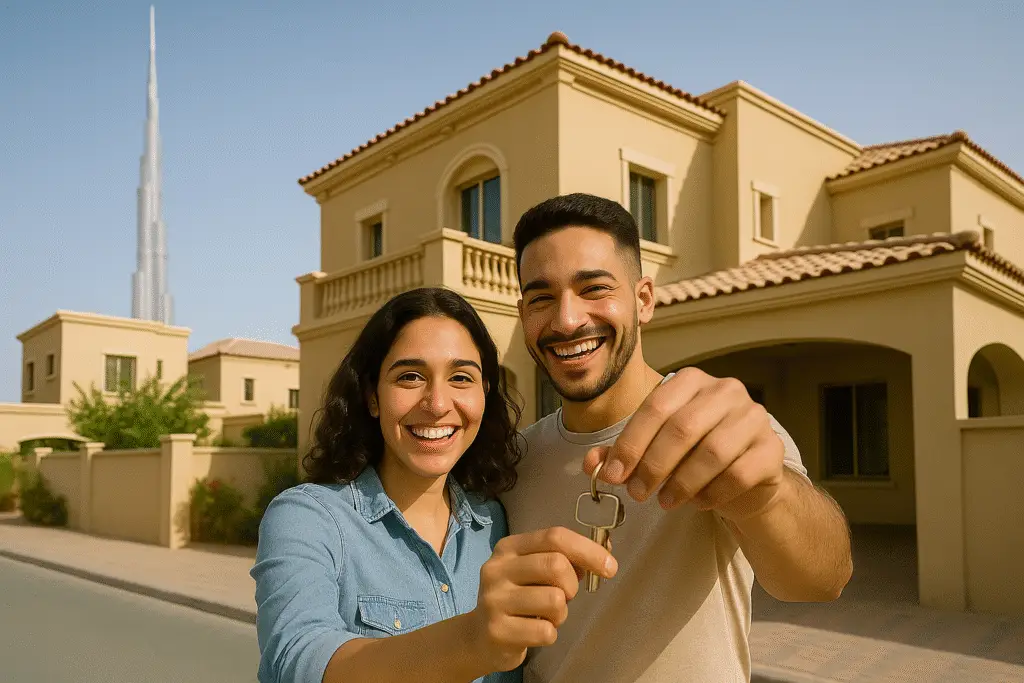In the UAE, buyers can choose between conventional mortgages (interest-based) or Islamic mortgages (Sharia-compliant financing).
Conventional Mortgages (Traditional Home Loans)
- Interest-based loans where you borrow money from the bank and repay it over time with interest.
- Available with fixed or variable rates.
- Faster approval process with flexible repayment terms.
Example: You borrow AED 1M at 4.5% interest over 25 years. You repay the bank in monthly installments that include the principal + interest.
Islamic Mortgages (Sharia-Compliant)
- Based on profit-sharing instead of charging interest.
- The bank buys the property and then sells or leases it to you with a built-in profit margin.
- Common types include:
- Murabaha (Cost-Plus Financing) → The bank buys the property and sells it to you at a marked-up price.
- Ijara (Lease-to-Own) → You pay rent to the bank until you fully own the property.
- Diminishing Musharaka → You co-own the property with the bank and gradually buy out their share.
Which One Should You Choose?
- If you prefer a traditional loan structure, go with conventional financing.
- If you want Sharia-compliant financing, an Islamic mortgage is the way to go.
Key Factors to Consider When Choosing a Mortgage
Before committing to a mortgage, compare these important factors:
Interest & Profit Rates
- Fixed-rate loans offer stability, while variable-rate loans fluctuate with market conditions.
- Islamic mortgage profit rates are often comparable to conventional interest rates.
Fees & Charges
- Processing fees: Usually 1% of the loan amount (may be negotiable).
- Early settlement fees: If you pay off your loan early, banks charge a fee (1-3% of the outstanding loan).
- Property valuation fees: AED 2,500 – 3,500.
Loan Term Length
- Mortgages in the UAE typically last up to 25 years.
- Shorter loan terms = higher monthly payments but less interest overall.
Loan-to-Value (LTV) Ratio
- Expats can finance up to 80% of the property value (for homes under AED 5M).
- This means you’ll need at least 20% for the down payment.
Hidden Costs to Watch Out For
Many first-time buyers forget about the extra costs that come with homeownership. Here’s what to budget for:
| Expense | Cost |
|---|---|
| Dubai Land Department Fees | 4% of property price |
| Real Estate Agent Commission | 2% of property price |
| Mortgage Registration Fee | 0.25% of loan amount + AED 290 |
| Property Valuation Fee | AED 2,500 – 3,500 |
| Mortgage Life Insurance | ~0.025-0.03% monthly on outstanding loan |
| Property Insurance | ~0.03-0.06% annually of property value |
| Community Service Charges | Varies by development (AED 10-25 per sq. ft.) |
Tip: Always factor these into your budget before signing any mortgage agreement.
How to Speed Up Your Mortgage Approval
Want to avoid delays? Follow these simple steps:
- Get pre-approved before house hunting (takes 24-48 hours).
- Prepare your documents (passport, salary certificate, bank statements).
- Avoid taking new loans or maxing out credit cards before applying.
- Choose a bank-approved property to speed up the process.
Need help? Mortgage experts like SettleIn can negotiate better rates and handle paperwork for you.
Final Thoughts: Which Mortgage is Best for You?
- If you want stable payments → Fixed-rate mortgage
- If you’re okay with fluctuations → Variable-rate mortgage
- If you prefer traditional financing → Conventional mortgage
- If you need Sharia-compliant financing → Islamic mortgage
Every buyer’s situation is unique, so choose a mortgage that fits your financial goals and long-term plans.
🔑 Thinking about buying a home in the UAE? Let’s chat! Get a free mortgage consultation today.




